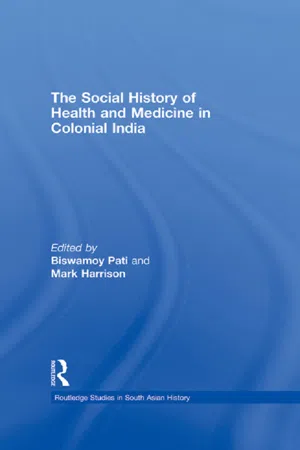
The Social History of Health and Medicine in Colonial India
- 256 pages
- English
- ePUB (mobile friendly)
- Available on iOS & Android
The Social History of Health and Medicine in Colonial India
About This Book
This book analyzes the diverse facets of the social history of health and medicine in colonial India. It explores a unique set of themes that capture the diversities of India, such as public health, medical institutions, mental illness and the politics and economics of colonialism. Based on inter-disciplinary research, the contributions offer valuable insight into topics that have recently received increased scholarly attention, including the use of opiates and the role of advertising in driving medical markets. The contributors, both established and emerging scholars in the field, incorporate sources ranging from palm leaf manuscripts to archival materials.
This book will be of interest to scholars of history, especially the history of medicine and the history of colonialism and imperialism, sociology, social anthropology, cultural theory, and South Asian Studies, as well as to health workers and NGOs.
Frequently asked questions
The Social History of Health and Medicine in Colonial India

Contents
- List of figures
- List of tables
- List of contributors
- Acknowledgements
- 1 Social history of health and medicine: Colonial India MARK HARRISON AND BISWAMOY PATI
- 2 Ranald Martin’s Medical Topography (1837): The emergence of public health in Calcutta PARTHO DATTA
- 3 Beyond the bounds of time? The Haj pilgrimage from the Indian subcontinent, 1865–1920 SAURABH MISHRA
- 4 ‘Subordinate’ negotiations: Indigenous staff, the colonial state and public health AMNA KHALID
- 5 Plague, quarantine and empire: British–Indian sanitary strategies in Central Asia, 1897–1907 SANCHARI DUTTA
- 6 Medical research and control of disease: Kala-azar in British India ACHINTYA KUMAR DUTTA
- 7 The leprosy patient and society: Colonial Orissa, 1870s–1940s BISWAMOY PATI AND CHANDI P. NANDA
- 8 Institutions, people and power: Lunatic asylums in Bengal, c. 1800–1900 WALTRAUD ERNST
- 9 ‘Prejudices clung to by the natives’: Ethnicity in the Indian army and hospitals for sepoys, c. 1870s–1890s SAMIKSHA SEHRAWAT
- 10 Racial pathologies: Morbid anatomy in British India, 1770–1850 MARK HARRISON
- 11 Pharmacology, ‘indigenous knowledge’, nationalism: A few words from the epitaph of subaltern science PROJIT BIHARI MUKHARJI
- 12 Creating a consumer: Exploring medical advertisements in colonial India MADHURI SHARMA
- 13 Opium as a household remedy in nineteenth-century western India? AMAR FAROOQUI
- Index
Figures
- 4.1 Sketch map of the site of Hardwar fair
- 4.2 Pilgrim route from Chandi to Kashipur
- 5.1 British India, the Levant and Central Asia
- 5.2 Quarantine bases and British sanitary interests in Persia and the Persian Gulf, 1890s
- 12.1 Glaxo Baby-food
- 12.2 Arogyata Kee Devi – Amrit Dhara
- 12.3 Tested for seventeen years, Pustrajvatika (registered)
Tables
- 4.1 Duties of the subordinate police at the Kumbh mela of 1891 at Hardwar
- 4.2 Composition of the sanitary patrols for each administrative section of the pilgrimage site at the Kumbh mela of 1891
- 4.3 Statement showing the pay per mensem for regular police and chaukidars
- 11.1 A catalogue of books dealing with ‘indigenous drugs’ published between 1790 and 1869
Contributors
Table of contents
- Cover Page
- Half Title Page
- Frontmatter 1
- Title Page
- Copyright Page
- Table of Contents
- List of figures
- List of tables
- List of contributors
- Acknowledgements
- 1 Social history of health and medicine: Colonial India—MARK HARRISON AND BISWAMOY PATI
- 2 Ranald Martin’s Medical Topography (1837): The emergence of public health in Calcutta—PARTHO DATTA
- 3 Beyond the bounds of time? The Haj pilgrimage from the Indian subcontinent, 1865–1920—SAURABH MISHRA
- 4 ‘Subordinate’ negotiations: Indigenous staff, the colonial state and public health—AMNA KHALID
- 5 Plague, quarantine and empire: British–Indian sanitary strategies in Central Asia, 1897–1907—SANCHARI DUTTA
- 6 Medical research and control of disease: Kala-azar in British India—ACHINTYA KUMAR DUTTA
- 7 The leprosy patient and society: Colonial Orissa, 1870s–1940s—BISWAMOY PATI AND CHANDI P. NANDA
- 8 Institutions, people and power: Lunatic asylums in Bengal, c. 1800–1900—WALTRAUD ERNST
- 9 ‘Prejudices clung to by the natives’: Ethnicity in the Indian army and hospitals for sepoys, c. 1870s–1890s—SAMIKSHA SEHRAWAT
- 10 Racial pathologies: Morbid anatomy in British India, 1770–1850—MARK HARRISON
- 11 Pharmacology, ‘indigenous knowledge’, nationalism: A few words from the epitaph of subaltern science—PROJIT BIHARI MUKHARJI
- 12 Creating a consumer: Exploring medical advertisements in colonial India—MADHURI SHARMA
- 13 Opium as a household remedy in nineteenth-century western India?—AMAR FAROOQUI
- Index